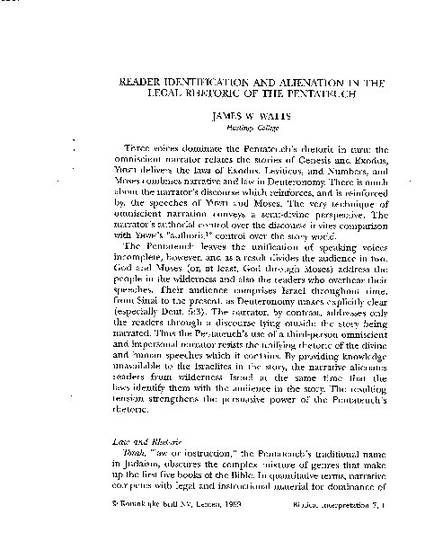
James W. Watts: 0000-0002-4872-4986
- Pentateuch,
- Moses,
- Exodus,
- rhetoric,
- divine inspiration,
- Hebrew law
Three voices dominate Pentateuchal discourse in turn: the omniscient narrator relates the stories of Genesis and Exodus, YHWH delivers the laws of Exodus, Leviticus, and Numbers, and Moses combines narrative and law in the rhetoric of Deuteronomy. These three dominant voices of the Pentateuch are interdependent and almost interchangeable: the anonymous narrator, like Moses the scribe, requires both divine inspiration and reader acceptance for authorization of the story; the divine lawgiver requires reader acceptance of human mediation of the commandments; the prophetic scribe depends on authority delegated by both God and readers to interpret the stories, the laws, and the sanctions. The Pentateuch leaves the unification of speaking voices incomplete, however, and as a result divides the audience in two. God and Moses (or, at least, God through Moses) address the people in the wilderness and also the readers who overhear their speeches. Their audience comprises Israel throughout time, from Sinai to the present, as Deuteronomy makes explicitly clear. The narrator, by contrast, addresses only the readers through a discourse lying outside the story being narrated. Thus the Pentateuch's use of a third-person omniscient and impersonal narrator resists the unifying rhetoric of the divine and human speeches which it contains. By providing knowledge unavailable to the Israelites in the story, the narrator persuades readers to both identify with and to alienate themselves from aspects of wilderness Israel.
